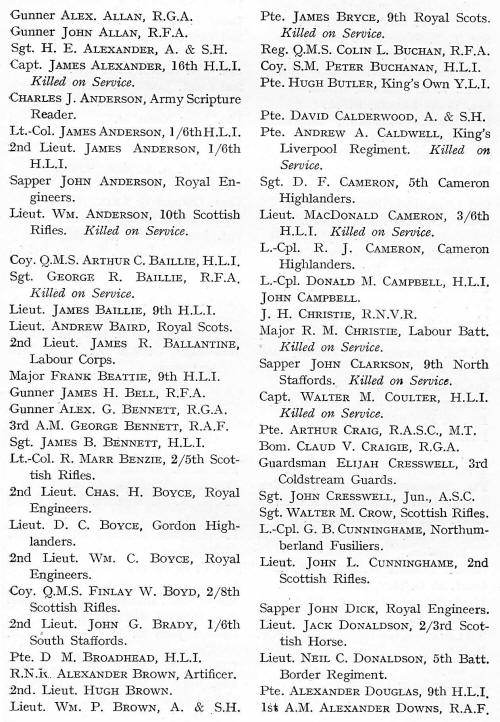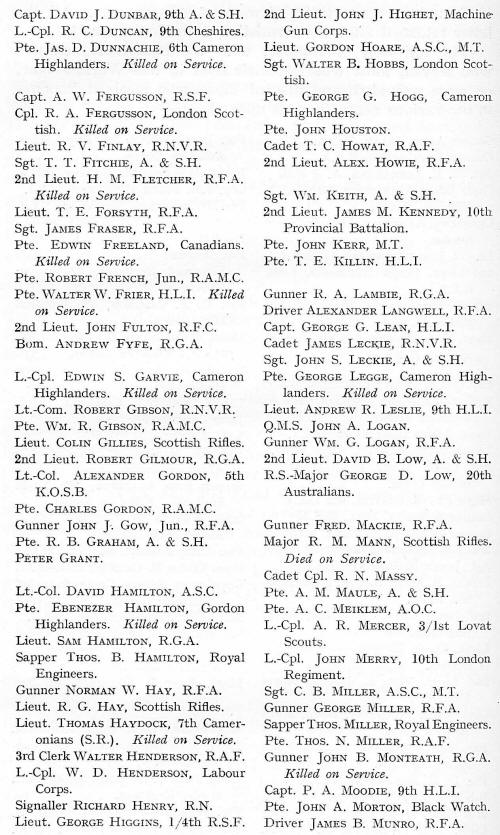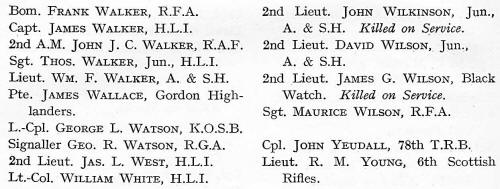|
War was declared against Germany, 4th August, 1914, because of the violation
of Belgium by that Power, without regard to the treaty guaranteeing the
integrity of Belgium signed by the Great Powers, of which Germany was one.
The " scrap of paper " on which the treaty was signed was torn up, as were
all international agreements, by Germany. The necessities of that country
were her only law. Kitchener's Army was brought into being, and volunteers
were at first called for, the call being freely responded to. Afterwards
conscription was introduced. The patriotic young men of this country did not
wait for compulsion to fight for their hearths and homes, and the
footballers were not tardy in flocking to the standard. Perhaps few clubs
have contributed more men to the cause than Queen's Park, whose members and
players were among the first to respond to Lord Kitchener's appeal for
volunteers. In this respect Queen's Park adherents have set an example to
many of the professional organisations. The members and players did not seek
shelter in munition works, and other safe employment of national importance.
The Scottish League, early in the campaign, brought in an enactment that all
registered players must engage in work other than football, else they were
not to be allowed to play. This rule did not in any way affect the Queen"s
Park. Members of committee headed the crusade against military ascendancy
and world power, players willingly followed, and many have given their lives
for their country. The Queen's Park kept in touch with these men. In
September arrangements were made to send out periodicals and newspapers,
cigarettes, etc., and the chairman, Mr. Thomas Robertson; the joint
treasurers, Messrs. Alex. M'Lean and Hugh Logan; and the secretary, Mr.
James Strang, were formed into a small committee to look specially after the
interests of the men at the front. So great was the exodus from the club
that it was thought one or two of the junior teams might require to be
suspended, the chief consideration being the maintenance of the First
Eleven. Both the Hampden and Victoria Elevens had to be dropped later, but
the Victoria team was in harness again, December, 1918. Instead of making
efforts to keep back the players, as other Glasgow clubs have managed to do
so successfully—some indeed of these clubs retaining their full teams, that
even conscription has not affected them—the Queen's Park acted, in a way, as
recruiting agents in its own ranks for the Territorial regiments. No
obstacles were placed in the way of players, and leave of absence was
granted to members of committee who joined the fighting, or Territorial
Forces. The desirability of the club taking action in connection with the
Glasgow Citizen Training Forces, the objects of which were to provide
military training for those who were unable, from age, family, or business
reasons, to join the Regular or Territorial Forces, was inquired into by a
sub-committee, specially appointed for the purpose, who recommended that an
endeavour be made to form a company from the club and friends of members,
but the necessary number was not forthcoming. Now arose the question of the
advisability of continuing football during the war—a question which agitated
the Queen's Park and other clubs in Glasgow, and elsewhere. The Scottish
Football Association and Scottish League were seriously concerned in this
matter, and were for a time at a loss what course to steer, and Government
interference was anticipated. The club would have to be guided by the
verdict of the authorities, as whatever course was recommended by the
controlling bodies would have to be followed, independent action on the part
of any one club not being desirable or necessary. This was also the opinion
of the Scottish Football Association, and guided its action.
The Scottish
League, in order to meet the altered conditions during the war, passed a
number of temporary rules, chief of which was that all players must be in
employment other than football, and cannot be played unless so employed, and
no compensation can be given for wages lost in outside employment in case of
injury received while playing football. Any football taken part in by League
clubs must be played only on Saturdays and recognised holidays. No club
shall pay a player a wage exceeding £1 per week and actual travelling
expenses, but should the profits at the end of a. season allow of it,
deferred pay, to an extent not exceeding £1 per week, may be added. No
football wages may be paid during the close season. The guarantee to
visiting clubs was reduced from £50 to £30. This partially met public
opinion. In addition, the League, in order to reduce the travelling of its
clubs, decided to drop Aberdeen, Dundee, and Raith Rovers from the
competition, reduce the League to eighteen •clubs, and bring in Clydebank.
The League recommended that each club make a collection on their grounds, as
near New Year's Day as possible, for transmission to King George's Naval
Fund. The collection at Hampden Park, 1st January, 1918, realised £79, which
sum was remitted to Mr. M'Andrew, secretary of the Scottish League; other
clubs did so well that £500 was in hand before 1st March, 1918. Further, a
League Cup competition was introduced, eight of the leading clubs taking
part in it, of which one was Queen's Park. The proceeds went to assist
necessitous soldiers and sailors who might be injured in the course of the
war. The Scottish Association, in September, 1914, sent a deputation to
the War Office to consult with the authorities, who were informed by the
S.F.A. it placed itself unreservedly in their hands in the matter of the
continuance, or suspension, of the playing of football in Scotland. The
deputation was unanimously of opinion that football should not be suspended.
The deputation was further of opinion, that the clubs under the jurisdiction
of the S.F.A. could render valuable assistance in the matter of recruiting,
and raising money for purposes of relief. A circular was sent to the clubs,
asking them to adopt the best means for enrolling recruits, and arrange for
well-known men to address players and spectators, and to keep in touch with
"the District Recruiting Officer. The circular ended "JOIN THE ARMY AT
ONCE," and was signed by Mr. J. K. M'Dowall, secretary, S.F.A.
A
conference of the four national associations was held in London, 3rd
December, 1914. Mr. D. Campbell detailed the decision arrived at by the
S.F.A. after the interview with the War Office authorities. Mr. J. C. Clegg
also reported having seen Mr. Tennant, the Under-Secretary for War, who did
not wish the entire stoppage of football, but thought public sentiment
should be met, and suggested, to meet public opinion, cup ties and
International matches should be with-drawn from the programme. Mr. Clegg
pointed out to Mr. Tennant the financial responsibilities of the clubs, and
of persons connected with the clubs, and that he was strongly opposed to
stopping the game. The conference adjourned for a short time to allow Mr.
Clegg to meet Mr. Tennant again, at the latter's request, who, it appears,
would be satisfied were cup ties and International matches abandoned, as a
concession to public opinion. Mr. Crump, however, moved, on returning to the
conference, that all football, including cup ties, with perhaps the
exception of International matches, be continued. This was opposed by the
Scottish delegates. It was agreed to divide the motion in two, when the one
proposing to withdraw International matches "was unanimously agreed to ; but
the second resolution, re playing cup ties, was strongly opposed by the
Scottish delegates, who, however, could not find a seconder to their
proposal to abandon them altogether. They pointed out the Scottish
Association had left itself unreservedly in the hands of the War Office, and
they were prepared to act independently, differently, and separately from
any such resolution. Things had now come to a deadlock. Neither party would
give way, England adhering to International matches only being suspended,
while Scotland would not give way on the question of cup ties. The Scottish
delegates saw Mr. Tennant after the conference, and he welcomed the attitude
of the S.F.A., who had adopted his view, and abandoned International and
Scottish Cup matches, which were not resumed until season 1919-20.
Affiliated associations were free to carry out their cup competitions, and,
in fact, have done so. The English Association carried through its cup
programme in 1914-15, but not afterwards, and the Scottish Association
stopped its competition at the end of the Qualifying stage in 1914-15. The
Football Association took umbrage at the Scottish Association not being
bound by the decision of the conference, and taking independent action re
cup ties, and a long correspondence followed, which ultimately ended in
England abandoning cup ties, and the two Associations were now at one as
regards common action. When Great Britain declared war on Germany,
immedi-ately the great heart of the country was appealed to for
subscriptions to various war charities. The first and greatest in the field
was the Prince of Wales' National Relief Fund, and in this, as with many
other war funds, the football clubs of the nation were called upon to.
assist. The Queen's Park, true to its traditions, was one of the first to
subscribe to the Prince of Wales' Fund, and here, as in all other cases
where the calls of charity were made on the clubs, its contribution was a
handsome one—namely, £250—which Mr. Thomas Robertson, the president, was
authorised to hand over to the Lord Provost of Glasgow, who took charge of
the City's contributions. To the Belgian Relief Fund £150 was subscribed,
and minor grants were given to other war schemes. The Queen's Park took part
in several competitions to raise funds for ameliorating the sufferings
caused through the war, and both the club, its funds, and also its ground,
were freely placed at the disposal of various schemes thought worthy of its
support. The first news received from the members of the club at the front
was eminently satisfactory—namely, that in April, 1915, a son of Mr. Tom
Robertson, an old player who came to the Queen's Park from Cowlairs, had
been awarded the D.C.M. for meritorious services. The first record of a
member's loss was the information that Private James Blair, a son of Mr.
Alexander Blair, had paid the supreme sacrifice in September of the same
year. In October, Lance-Corporal Edwin S. Garvie, one of the most prominent
First Eleven players, died a prisoner of war in Germany, from wounds
received in action, and the great grief the club felt at the extinction of a
most promising career was recorded in the minutes. Lieutenant William
Anderson was killed in France about the same time, while leading his troops
into action. Trooper Andrew B. M'Crae, Lovat Scouts, another First Eleven
player, met his death in Gallipoli. Sympathy with the families of these
players is recorded in the minutes. Sympathetic references were made to the
loss sustained by Mr. James Hamilton in the death of the youngest of his
three sons, George C. J. Hamilton, all of whom had enlisted. Private Harry
N. Robertson, 17th H.L.I., one of the players of the club, was killed in the
trenches in August, 1916. In 1915 the club decided to keep a Roll of Honour,
and a printed list of the members on Service was submitted to the annual
general meeting, 26th April, 1917, which contained the names of 165 members,
nine of whom had then fallen in the war. Sad to relate, many names had to be
added to the list of casualties since that date, and some were prisoners of
war in Germany, where their lot was not a happy one. All the latter returned
after the Armistice, 11th November, 1918.
The full Roll of Honour, with
the names of members who served, those who lost their lives in this World's
War, or were wounded, and also of those who received honours in the various
campaigns, is appended :—




QUEEN'S PARK F.C. MEMORIAL SERVICE
In Queen's Park East
U.F. Church, Crosshill, on Sunday afternoon, 23rd March, 1919, a memorial
service for the members and players of Queen's Park Football Club who had
fallen in the war, was conducted by Colonel the Rev. J. Golder Burns, B.D.,
chaplain to the Forces. There was a large attendance of members of the club,
many of them in uniform, and of the general public. In front of the pulpit
was hung a Union Jack, with a laurel wreath, and underneath, a flag bearing
the badge and initials of the club in black on a white ground. In his
address, the Rev. Mr. Burns mentioned that no fewer than 216 members had
gone on Service, and that many honours had been won. He gave some of his own
experiences of four years on service, and afterwards, dealing with the
origin of the war, said that it was the result of a wicked conspiracy, of
which he heard a good deal when studying in Germany twenty years ago. He
outlined the aims of Great Britain in entering the war, and said that they
had been completely fulfilled. The British Army had saved Belgium and
France. Had any one of the Allies stood out, the war might have been won,
but without the British Army it would have been lost in the first six
months. The reverend gentleman read the club's Roll of Honour, the
congregation standing. The roll contained the names of twenty-seven officers
and men, members of the club, who had lost their lives in the war. After the
benediction and Seven-Fold Amen, the Dead March in "Saul" was played, the
"Last Post" sounded, and the congregation joined in singing the National
Anthem. |

